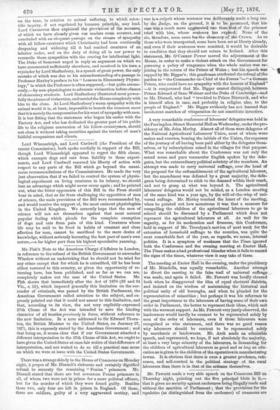The meeting at Exeter Hall in the evening, under the
presidency of Mr. Mundella, was equally remarkable. Another attempt to divert the meeting to the false trail of universal suffrage was made, and again it failed. Mr. Fawcett was loudly cheered both when he disapproved the idea of equal electoral districts, and insisted on the wisdom of maintaining the historical and political unity of old boroughs, and when he pleaded for the representation of minorities ; but perhaps it was his reference to the great importance to the labourers of having some of their own order in Parliament, the better to represent their ideas, which met with the warmest support. As Mr. Fawcett very justly observed, the landowners would hardly be content to be represented solely by men of the order of labourers, even if those labourers were recognised as wise statesmen, and there was no good reason why labourers should be content to be represented solely by merchants or landowners. Mr. Arch made an admirable speech, and represented, we hope, if not absolutely the majority, at least a very large minority of the labourers, in demanding for the children of agricultural labourers as good and as long an edu- cation as is given to the children of the operatives in manufacturing towns. It is obvious that there is even a greater prudence, reti. cence, and self-control in the political strategy of the rural labourers than there is in that of the artisans themselves.






























 Previous page
Previous page